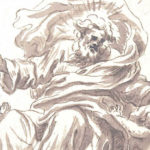We run our website the way we wished the whole internet worked: we provide high quality original content with no ads. We are funded solely by your direct support. Please consider supporting this project.

The Trinity and the Crucified God
God has always been willing to stoop to accommodate the fallen state of his covenant people in order to remain in a transforming relationship with them and in order to continue to further his sovereign purposes through them. This is revealed in the life and death of Jesus.
Out of love for humankind, Jesus emptied himself of his divine prerogatives, set aside the glory he had with the Father from before the foundation of the world, became a human being, and bore our sin as he died a God-forsaken death on Calvary (Phil 2:5-7). Though Jesus remained fully God, he entered into total solidary with humanity by becoming a full human being. And though Jesus remained sinless, he entered into total solidarity with our sin and condemnation, to the point that Paul boldly proclaimed that Christ in some real sense became our sin and became our curse (2 Cor 5:21; Gal 3:13). The cross reveals a God of covenantal love who is not above setting aside his glory to accommodate the limitations and sin of his fallen people.
So too, the cross reveals a God of unfathomable humility and mercy who is not above stooping to appear far less beautiful than he actually is—to appear as a guilty, crucified criminal!—in order to save us and to continue to achieve his sovereign purposes through his covenant people. It thus reveals a God who is willing to condescend to appear in ways that reflect more of the sin of his people than they reflect the way he actually is, thereby disclosing his sin-bearing character. The humble, self-sacrificial love displayed on the cross reflects the character of God’s very essence (hupostasis, Heb. 1:3) as well as the way God has always been relating to, and working through, his covenant people.
Reflecting on the revelation of the crucified God leads us to the most profound, beautiful, and important mystery of the Christian faith. The fullest and clearest revelation of God’s true nature took place precisely when God stooped to take on a semblance that is antithetical to his true nature. What could be more antithetical to the all-holy God than to, in some sense, become our sin (2 Cor. 5:21)? While this revelation of course never ceases to be wonderfully mysterious, I believe it can be rendered intelligible, but only when we accept that God’s eternal nature is a union of three divine Persons who eternally give themselves wholly to one another in perfect, humble, self-giving love.
As Father, Son and Holy Spirit, God is from all eternity a self-giving God who pours himself out for “another.” Indeed, this is not only something the three Persons of the Trinity do; this is who the triune God eternally is. This is the meaning of the revelation that God is love—the kind of love that is revealed when God stoops to the infinite extreme of becoming a human and dying on a cross for a race of people who could not deserve it less (1 Jn 4:8; 3:16).
The revelation of the Trinity renders the revelation of God on the cross intelligible because it means that when God humbly poured himself out on behalf of humanity by stooping to the furthest extreme possible—viz. by fully identifying with our humanity, our sin, and our judgment—he was not doing something foreign to himself. To the contrary, by stooping in this way, the eternal triune God was simply enveloping humans into the self-giving, triune, love that he eternally is. As paradoxical as it sounds, when God, the Son, stooped to the infinite extremity of experiencing God-forsakenness on the cross, he was manifesting outwardly in time the perfect unity he eternally enjoys with the Father.
Only by understanding the homoousion (Jesus as “one in being” with the Father) of the Nicene Creed as a perfect unity of self-giving Trinitarian love can we simultaneously affirm the unbroken union between the Son and the Father, on the one hand, while affirming the authenticity of Christ’s cry, “Eli, Eli, lama sabachtani,” (“My God, my God why have you forsaken me?) on the other. If we affirm any other sort of unity, then Jesus’ entrance into the God-forsakenness of our sin and bondage to the devil would undermine the unity of the Trinity and thereby virtually destroy the Godhead! Once we understand the divine unity to be other-oriented love, however, then Jesus’ forsakenness can be understood as expressing, rather than undermining, the infinite intensity of this unity, for there could be no greater expression of other-oriented love than this.
Because God’s true eternal nature is a perfect, other-oriented, self-giving fellowship of three divine persons, we can render intelligible the paradoxical claim that God is revealed by becoming something that is not only different from himself (a human being), but that is even utterly antithetical to himself (our sin and God-forsakenness). The infinite intensity of the perfect love that is the eternal character of the triune God is revealed in the fact that God condescended to the furthest extreme possible—viz. into his own self-negation—out of love for a race of rebels who wanted only to crucify him.
For more on this topic, see Greg’s Crucifixion of the Warrior God.
Photo credit: Cea. via Visual hunt / CC BY
Category: General
Tags: Character of God, Cruciform Theology, Love, Nature of God, Trinity
Topics: Attributes and Character, Trinity
Related Reading

Christus Victor Atonement and Girard’s Scapegoat Theory
Many of the major criticisms of Crucifixion of the Warrior God that have been raised since it was published four weeks ago have come from folks who advocate Rene Girard’s understanding of the atonement. A major place where these matters are being discussed is here, and you are free to join. Now, I have to…

How NOT to be Christ-Centered: A Review of God With Us – Part III
In the previous two posts on Oliphint’s God With Us, we’ve seen that Oliphint is trying to reframe divine accommodations in a Christ-centered way, but that what he means by this is not that he is going to derive his understanding of God from Christ, but that he is going to use the “hypostatic union”…

Friday Lights: Refuge
Each Friday we post content sent to us by our readers that is inspiring, funny, lighthearted or just generally fun. If you’d like more information on submitting content for this feature you can get more information here. Jean Rath sent us the video above, along with an article that chronicles how this family escaped war and terror…

Podcast: Isn’t God Withdrawing the SAME as Him Personally Punishing and Causing Violence?
Greg discusses whether the passivity of withdrawal is distinguishable from active punishment. http://traffic.libsyn.com/askgregboyd/Episode_0186.mp3

Would God Kill a Baby To Teach Parents a Lesson?
Question: We have a group of guys that are going through your book “Is God to Blame” and a question came up that I would be curious how you would look at it. In the beginning of the book you ask the question “do you really think that God kills babies to teach parents a lesson?”…

Why Greg Can’t be Accused of Marcionism (Let’s Not Burn Him at the Stake Just Yet)
Kristin Brenemen via Compfight Richard Beck posted a blog today entitled It’s the Same God: On Marcionism, Creeds, Hermeneutics and War. You’re going to want to take the time to read through it in its entirety. Greg has been accused of Marcionism quite a lot as a result of the working out of his Cruciform…
